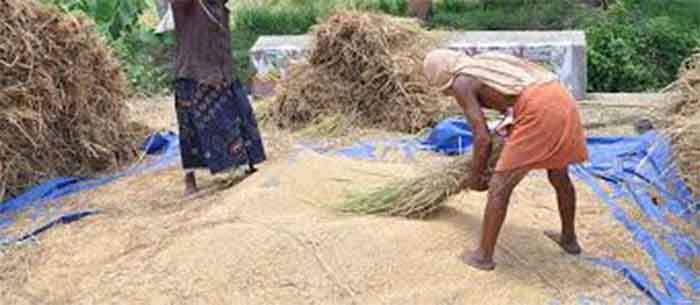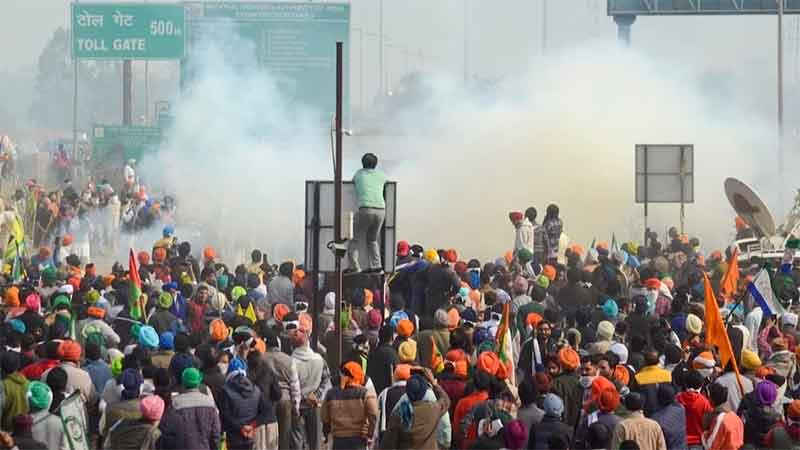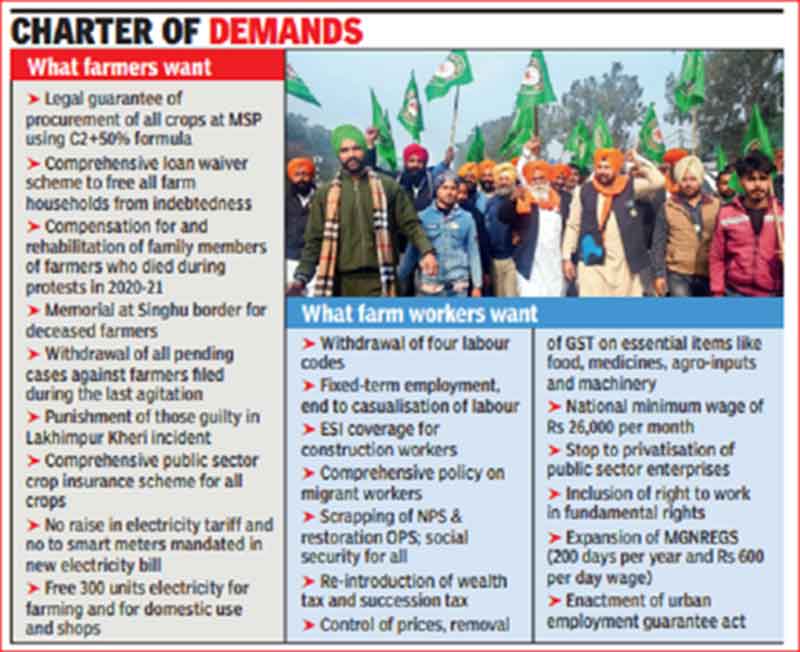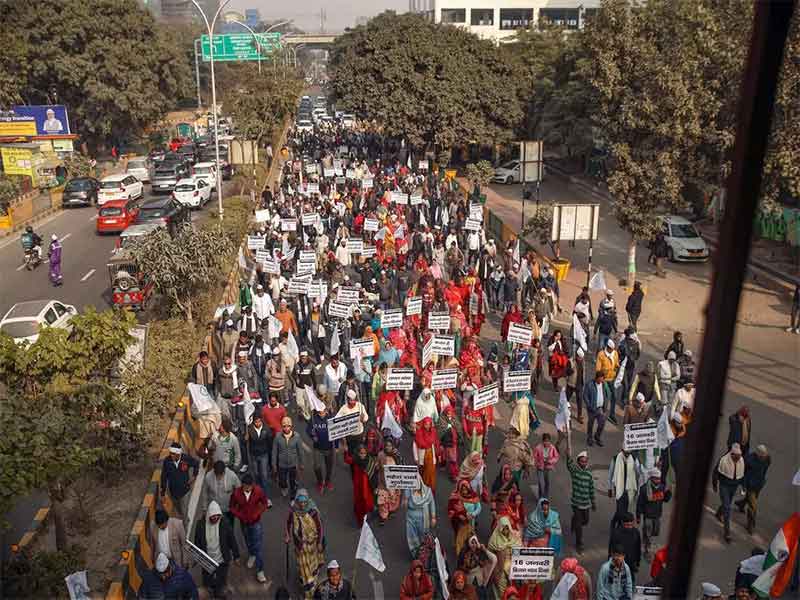
Prime Minister Narendra Modi’s claim that the left parties did not implement APMC Act is firmly being refuted by Kerala government and farmer’s union.
Prime Minister Narendra Modi while announcing PM-KISAN scheme questioned the opposition parties who have extended their support to the protesting farmers in Delhi but ignored the non-implementation of APMCs in states like Kerala.
“The groups who are talking about mandis, APMC are the ones who destroyed West Bengal and Kerala. There are no APMCs and mandis in Kerala. So, why are there no protests in Kerala? Why don’t they start a movement there? They are only misguiding the farmers of Punjab,” said the PM.
Responding to Prime Ministers allegation Kerala Agriculture Minister V S Sunil Kumar said tht Narendra Modi is blaming the Left parties in Kerala for his moral defeat before the historic struggle of farmers.
“The Prime Minister has alleged the Left parties are playing politics in Punjab. He said they are doing event management and asked why the farmers in Bengal are not protesting. His allegation that those who conduct agitation for farmers are playing politics prove that he has become an agent of monopolies,” Sunil Kumar said.
Replying to PM’s question as to why the Left Government in Kerala did not implement the APMC and Mandi, he said: “In 2003, when the APMC Act was implemented, each state was given the right to decide whether they should implement the Act. For, agriculture is a subject in the concurrent list.
Apart from Kerala, Manipur, Bihar, Jammu Kashmir and several other states also did not implement the Act. Those states which framed the law considered the specialities peculiar to them,” he said. “But now, the Central Government has made unilateral legislation on a state subject and has imposed it upon states.”
Kerala Finance Minister Thomas Issac hit hard at the prime minister with a couple of tweets. He said Kerala is providing MSP far beyond as mandated by the APMC act.
Why doesn’t Kerala have Mandi system? Elementary bakht -more than 80% of our cropped area are under commercial crops for which there are separate Commodity Boards with independent marketing regulations. (Coconut exempted.) Yet we intervened with MSP to protect the farmers.
— Thomas Isaac (@drthomasisaac) December 27, 2020
Honourable PM has got it all wrong. Kerala has MSP not only for paddy, which is ₹900 per quintal higher than what has been prescribed by Centre but also for 16 types of vegetables and commercial crops like rubber and coconuts. Wait for Kerala budget for full response.
— Thomas Isaac (@drthomasisaac) December 26, 2020
The All India Kisan Sabha (AIKS) responded by saying that the Prime Minister’s statements reflected his ignorance about Kerala. “Either he is being misled by his advisers or is deliberately resorting to deceit,” it said. Kerala, said the AIKS, did not pass an APMC Act in its State Assembly, along with many other States such as Manipur and Jammu and Kashmir, because the cropping pattern was dominated by plantation crops and spices.
Commercial crops are grown in 82 per cent of the cultivated area in the State. Cash crops like coconut, cashew, rubber, tea, coffee and spices like nutmeg, pepper, cinnamon, cloves, cardamom are grown by the farmers there and these crops have their own specialised marketing channels sponsored by the commodity boards under the Ministry of Commerce. The prices for these crops are dependent on world market prices and “except for copra, the Central government did not even announce any MSP” for the crops grown in Kerala.
Even though these crops fetched good foreign exchange, successive Central governments had diluted and dismantled the commodity boards. The boards were starved of funds and were not adequately staffed. The India-ASEAN free trade agreements entered into by Congress and BJP regimes at the Centre had led to dumping and price crashes. In 2006, the Left Democratic Front (LDF) government set up a Debt Relief Commission that halted the spate of suicides that had occurred in Kerala. The LDF government, stated the AIKS, had stood by the farmers when prices crashed and, with the help of co-operatives, aided in value addition and marketing. “The extent of marketed surplus of other crops like paddy or fruits of vegetables was never significant enough to require large and regulated wholesale markets like the Mandis under the APMC Acts. This does not mean that there are no agricultural markets with specified rules and regulations,” stated AIKS.
The letter also mentioned that Kerala procured paddy at Rs.2,748 a quintal, which was Rs.900 more than the Central MSP of Rs.1,848 for paddy. The Kerala government had recently announced a royalty of Rs.2,000 per hectare for rice cultivators, spread across 2.05 lakh hectares in the State. The government had also announced the base prices for 16 vegetables, including tubers, making it the only State to have done so. The State gave subsidies for different crops. For paddy, it was Rs 22,000 per hectare; for pulses it was Rs.20,000; for tapioca and tubers, Rs.30,000 and a similar amount for bananas. Local self-governing institutions also provided various subsidies. The Prime Minister, the AIKS said, “should first try to match these steps and answer why the commodity boards were being rendered ineffective” and why the Central government was entering into free trade agreements without consulting State governments.
It is a fact that Kerala does not have any Agricultural Produce Market Committee (APMC) or mandis. There are good reasons for this. The production of food crops such as paddy and pulses is limited (most of it is imported from other states), and there is not much surplus left to trade in APMC market yards. There are six major wholesale markets (in Thiruvanantapura, Khozikode, Ernakulam, and Wayanad). These markets are already integrated with recently established E-market network. To weed out middle men and protect small farmers in the markets, Kerala State Civil Supplies Corporation (SUPPLYCO), along with different cooperative institutions and local self-government institutions procure rice, vegetables and fruits.
Cultivation of Paddy is limited in Kerala (11.86% among all food crops) as compared to other states. The major cultivated area (~ 82%) is occupied by plantation crops like rubber and spices such as black pepper and fruits like coconut. The state government’s horticultural board is actively involved in procurement and assistance of export of various spices and plantation crops.
The Left government in Kerala has announced that it will be challenging the farm acts in the Supreme Court, contending that they violate federal principles enshrined in the Constitution.
SIGN UP FOR COUNTERCURRENTS DAILY NEWSLETTER












































